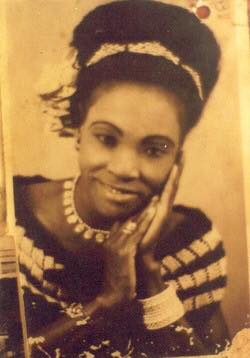Margaret Ekpo facts for kids
Quick facts for kids
Margaret Ekpo
|
|
|---|---|

President of the Women's wing of N.C.N.C
|
|
| Member, Regional House of Assembly | |
| In office 1961–1965 |
|
| Personal details | |
| Born | 27 June 1914 Creek Town, Nigeria Protectorate |
| Died | 21 September 2006 (aged 92) Calabar |
| Political party | N.C.N.C |
| Spouse |
John Udo Ekpo
(m. 1938) |
| Children | 2 |
| Alma mater | Dublin Institute of Technology |
Chief Margaret Ekpo (born July 27, 1914 – died September 21, 2006) was a brave Nigerian woman. She fought for women's rights and helped bring people together. Margaret Ekpo was one of the first female politicians in Nigeria's early years as an independent nation. She was a key leader among Nigerian women who worked for change. She played a big part in politics in Aba, especially during the time Nigeria was moving towards independence from colonial rule.
Contents
Early Life and Education
Margaret Ekpo was born in Creek Town, Cross River State. Her father was Okoroafor Obiasulor and her mother was Inyang Eyo Aniemikwe. Her mother was part of the royal family of King Eyo Honesty II. Margaret finished her basic schooling in 1934. She wanted to become a teacher.
However, her father passed away in 1934. This meant she had to put her dreams of more education on hold. She then started working as a teacher in elementary schools. In 1938, she married a doctor named John Udo Ekpo.
Her husband was from the Ibibio group. Margaret herself had both Igbo and Efik family roots. Later, the couple moved to the city of Aba.
In 1946, Margaret got a chance to study abroad. She went to what is now Dublin Institute of Technology in Dublin, Ireland. She earned a special diploma in domestic science. This taught her about managing a home. When she returned to Nigeria, she opened a school in Aba. There, she taught domestic science and sewing.
Political Journey and Activism
Starting in Politics
Margaret Ekpo first got involved in politics in 1945. Her husband was upset with how the colonial rulers treated Nigerian doctors. But as a government worker, he could not attend meetings about it. So, Margaret Ekpo went to these meetings for him.
These meetings were about unfair practices by the colonial government. They also discussed how Nigerians were treated differently in jobs. Margaret later went to a political rally. She was the only woman there. Important leaders like Nnamdi Azikiwe spoke at this rally.
By the late 1940s, she had started a Market Women Association in Aba. This group brought together women who sold goods in the markets. She used this association to unite women. It became a platform to fight for women's economic rights. They also pushed for more political rights for women. Margaret Ekpo's political work stopped when the Nigerian Civil War began. During the war, she was held in prison for three years.
Fighting for Rights
Margaret Ekpo knew that women around the world were fighting for their civil rights. This made her want the same for women in Nigeria. She wanted to challenge the unfair ways that colonial rule limited women. She felt that women in other countries, like Britain, had more say in politics. Nigerian women, she believed, deserved the same.
She joined the National Council of Nigeria and the Cameroons (NCNC). This group was leading the fight for decolonization, which meant Nigeria becoming independent. In the 1950s, she worked with Funmilayo Ransome-Kuti. They protested against the killing of workers at an Enugu coal mine. These workers were protesting unfair colonial rules.
In 1953, the NCNC chose Ekpo to join the regional House of Chiefs. This was an important council. In 1954, she started the Aba Township Women's Association. As the leader of this new group, she gained the trust of many women. She turned the group into a powerful political force. By 1955, women in Aba voted more than men in a city election.
Margaret Ekpo won a seat in the Eastern Regional House of Assembly in 1961. This position allowed her to work on issues important to women. She focused on helping women make progress in business and politics. She also worked on improving roads to markets and general transport in rural areas.
Honors and Legacy
After a military takeover ended the First Republic, Margaret Ekpo became less active in politics. In 2001, the airport in Calabar was renamed the Margaret Ekpo International Airport. This was a great honor for her. She passed away five years later, in 2006.
See also
In Spanish: Margaret Ekpo para niños
 | John T. Biggers |
 | Thomas Blackshear |
 | Mark Bradford |
 | Beverly Buchanan |

